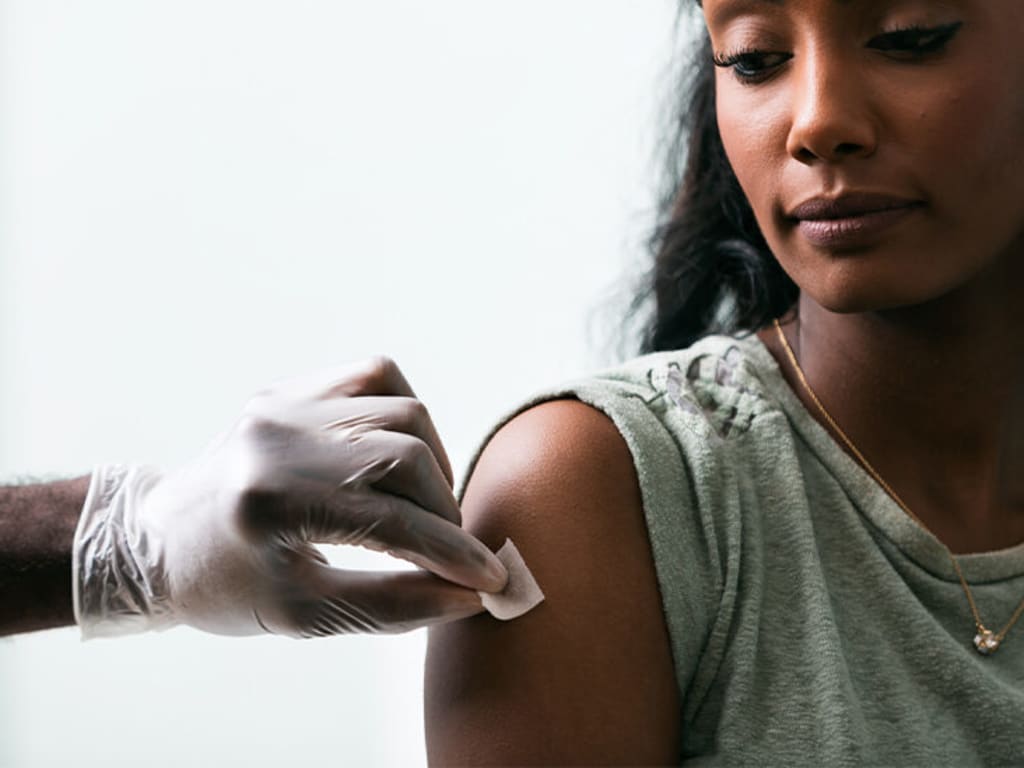Women Report Worse COVID-19 Vaccine Side Effects Than Men
Experts give reasons women have worse side effects than men after being vaccinated.

When people get vaccinated with the first dose of COVID-19, they are informed that there might be some minor side effects. They are told that this will more likely happen with the second dose than with the first dose. However, some people don't experience any side effects from either dose. On the other hand, some people do encounter some or all of the side effects they had been warned about. What is very interesting is that statistics clearly show that more women than men are reporting side effects from the vaccines.
The Centers for Disease Control and Prevention (CDC) have noticed that reactions to the vaccinations in the United States are much different in women than in men. At the time of this writing, 79.1 percent of the 6,994 people who actually reported side effects were women.
CDC researchers have found that most people who experienced minor reactions after receiving the Moderna and Pfizer vaccines were women. They experienced headaches, other body aches, chills, fever, and fatigue while most men had very mild symptoms or no symptoms at all. So, why do women experience worse side effects from the COVID-19 vaccine than men?
Possible Side Effects
Some people refuse to get vaccinated because they have heard about the following possible side effects.
- Pain in the arm where the vaccine is given
- Redness around the area where vaccinated
- Swelling in the arm where around the vaccinated area
- Fatigue
- Headache
- Muscle pain
- Chills
- Fever
- Nausea
Even if you get the above side effects, they last only for a day or two. They are a small price to pay for protection against COVID-19. The benefit of getting the vaccine and not dying from COVID-19 far outweighs the risks of the side effects.
Women Report Side Effects More Than Men
Studies have found that more women than men have reported side effects from the vaccine. Therefore, records don't show the percentage of men who have actually experienced side effects. It's entirely possible that men are also having side effects after being vaccinated. They just don't readily report their symptoms as women do.
William Schaffner, MD, an infectious disease specialist and professor at the Vanderbilt University School of Medicine, contends that women have more autoimmune diseases than men. That means women's immune system is more reactive. Dr. Schaffner added that hormonal differences might have something to do with the reason more side effects are reported from women. According to Schaffner, estrogen "jazzes up" the immune system, while testosterone seems to dampen it a little.
Women's health expert Jennifer Wider, MD, says men and women also metabolize drugs differently, and the antibody responses to vaccines can also be slightly higher in women than in men. In other words, when a woman gets a COVID-19 vaccine, her body creates a stronger immune response that results in more intense side effects.
What To Do About Side Effects
If you get side effects whether you are a woman or a man, the CDC wants you to know that you shouldn't freak out because side effects are normal signs that the vaccine is doing what it is supposed to do. Side effects are indications that the body is building protection against the virus if you ever come into contact with it. Side effects usually are sure indicators that the body is producing an immune response that will fight against the COVID-19 virus.
Jamie Alan, associate professor of pharmacology at Michigan State University, says everybody should know that it's actually a good sign to have side effects from the vaccine because it means the vaccine is working.
The CDC and primary physicians recommend taking over-the-counter medications such as aspirin, ibuprofen, acetaminophen, or antihistamines, for any pain and discomfort you may have. The CDC warns against taking any of those medications before you get vaccinated because they might interfere with how well the vaccines work. Some people try to get ahead of the pain by taking pain medication before taking COVID-19 vaccines. However, that is not advised.
If your arm is sore or swollen, the CDC suggests putting a clean, cool, wet washcloth over the area as well as moving your arm more. If you have a fever, drink plenty of fluids and dress lightly. If your side effects are severe or if you don't get relief from the above methods, call your primary physician who will probably tell you the same things.
Disclaimer
The information in this article is accurate at the time of the writing. However, information changes day by day. Therefore, readers are encouraged to stay informed of current information from the CDC, WHO, and local public health departments as resources.
I had no side effects from my first dose of Pfizer. From my second dose, I had a headache, severe body aches, and chills for only one day. If I had to do it all over again, I wouldn't hesitate because I want to be part of the herd immunity.
About the Creator
Margaret Minnicks
Margaret Minnicks shares articles with readers all over the world. Topics include celebrities, royal family, movies, television, foods, drinks, health issues, and other interesting things. Thanks in advance for TIPS that are sent my way.






Comments
There are no comments for this story
Be the first to respond and start the conversation.